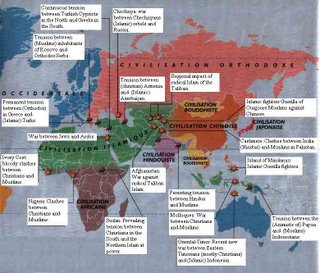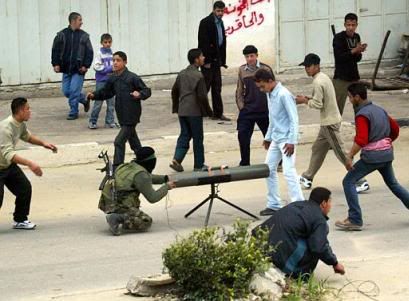Thursday, May 11, 2006
Which is it, anti-German sentiments in the Muslim world or Anti-Islam sentiments in Europe?
http://www.iht.com/articles/2006/05/10/news/islam.php
A death in Berlin reignites Muslim anger
By Richard Bernstein The New York Times
THURSDAY, MAY 11, 2006
BERLIN After months of angry protests against the publication of 12 caricatures of the Prophet Muhammad, first printed in a small Danish newspaper last year, Europe appeared relieved that the anger in the Islamic world has seemed to dissipate.
But the case of Amer Cheema, a Pakistani who was arrested in March after allegedly trying to assassinate a newspaper editor in Berlin, and then died on May 3 while in police custody, has stoked anti-German sentiment in some parts of the Muslim world.
The incident revived fears among some Germans that the cartoon issue may not have dissipated after all.
Cheema's death, described by the police as a suicide, prompted angry demonstrations in Pakistan and accusations by his family that the police tortured him to death.
But Wednesday, in an attempt to quell the anger, German prosecutors announced the results of an autopsy carried out in the past few days in the presence of two investigators from Pakistan to make an independent judgment about the cause of Cheema's death.
The prosecutors said that Cheema had committed suicide and that nobody else was involved in his death.
Cheema was caught by security guards in the lobby of the Axel Springer Building here in Berlin, where the newspaper Die Welt, which reprinted the Muhammad cartoons earlier this year, is published.
He told the police that his aim was to assassinate Roger Köppel, a Swiss citizen who is Die Welt's editor in chief.
The assassination attempt seemed reminiscent of the murder two years ago of Theo van Gogh, the Dutch filmmaker who was stabbed to death by an Islamist fanatic angry over a film that van Gogh had produced that the killer deemed had insulted Islam.
In recent weeks, German investigators have noted that at least one Islamist online magazine, Ansar al Sunna, publicized a list of every newspaper that reprinted the cartoons.
The Ansar al Sunna Web site urged Muslims to exact revenge against the newspapers that then reprinted the cartoons, including five in Germany and others elsewhere in Europe, saying that the editors of those papers should suffer the fate of van Gogh.
"The way of Jihad against the enemies of Allah is still open," the magazine said.
Also, in his most recent broadcast, on April 23, Osama bin Laden dwelled on the offense given by the cartoons and urged Muslims "to punish those responsible."
But German intelligence experts who track Muslim extremism here were treating the case of Cheema as an isolated event, saying that they had no information of any organized plans to attack those involved in reprinting the cartoons.
"We have had a high level of danger since September 11 everywhere, including Germany," said Claudia Schmid, head of the Berlin office of the main domestic intelligence service. "But I don't think that this event has had a big effect here."
By "this event," Schmid was referring to the publication of the Muhammad cartoons.
But Schmid said that the main danger of terrorist attacks comes from small independent groups or individuals who are not usually connected to Al Qaeda or to bin Laden, but who are inspired by the general call for vengeance against the supposed enemies of Islam.
She said that it is difficult for intelligence services to keep track of these groups or individuals in part because they often seem integrated into society.
The would-be assassin of Köppel seems to fit that profile.
German prosecutors said that Cheema had lived in Mönchengladbach, a city in the western party of Germany, since November 2004, doing a postgraduate course of study in textiles and clothing.
He came to Berlin a week before his alleged attempted assassination, bringing with him a knife that he had bought in Mönchengladbach; he stayed with friends.
But he seemed far from a professional assassin, going to the lobby of the Axel Springer house on March 20 and demanding to see the editor of Die Welt.
Guards in the lobby called the police, who arrested Cheema. Cheema readily admitted that he wanted to kill Köppel and, prosecutors said, he declined to express any regret for his attempt to do so.
Cheema was held in a cell with at least one other prisoner, feeding speculation and accusations, particularly in Pakistan, that he was murdered.
But in their announcement of the autopsy report Wednesday, the German officials said they had concluded that he hanged himself using a noose he made from his clothing.
They said that Cheema was alone in the cell at the time of his death.
Souad Mekhennet contributed reporting for this article.
BERLIN After months of angry protests against the publication of 12 caricatures of the Prophet Muhammad, first printed in a small Danish newspaper last year, Europe appeared relieved that the anger in the Islamic world has seemed to dissipate.
But the case of Amer Cheema, a Pakistani who was arrested in March after allegedly trying to assassinate a newspaper editor in Berlin, and then died on May 3 while in police custody, has stoked anti-German sentiment in some parts of the Muslim world.
The incident revived fears among some Germans that the cartoon issue may not have dissipated after all.
Cheema's death, described by the police as a suicide, prompted angry demonstrations in Pakistan and accusations by his family that the police tortured him to death.
But Wednesday, in an attempt to quell the anger, German prosecutors announced the results of an autopsy carried out in the past few days in the presence of two investigators from Pakistan to make an independent judgment about the cause of Cheema's death.
The prosecutors said that Cheema had committed suicide and that nobody else was involved in his death.
Cheema was caught by security guards in the lobby of the Axel Springer Building here in Berlin, where the newspaper Die Welt, which reprinted the Muhammad cartoons earlier this year, is published.
He told the police that his aim was to assassinate Roger Köppel, a Swiss citizen who is Die Welt's editor in chief.
The assassination attempt seemed reminiscent of the murder two years ago of Theo van Gogh, the Dutch filmmaker who was stabbed to death by an Islamist fanatic angry over a film that van Gogh had produced that the killer deemed had insulted Islam.
In recent weeks, German investigators have noted that at least one Islamist online magazine, Ansar al Sunna, publicized a list of every newspaper that reprinted the cartoons.
The Ansar al Sunna Web site urged Muslims to exact revenge against the newspapers that then reprinted the cartoons, including five in Germany and others elsewhere in Europe, saying that the editors of those papers should suffer the fate of van Gogh.
"The way of Jihad against the enemies of Allah is still open," the magazine said.
Also, in his most recent broadcast, on April 23, Osama bin Laden dwelled on the offense given by the cartoons and urged Muslims "to punish those responsible."
But German intelligence experts who track Muslim extremism here were treating the case of Cheema as an isolated event, saying that they had no information of any organized plans to attack those involved in reprinting the cartoons.
"We have had a high level of danger since September 11 everywhere, including Germany," said Claudia Schmid, head of the Berlin office of the main domestic intelligence service. "But I don't think that this event has had a big effect here."
By "this event," Schmid was referring to the publication of the Muhammad cartoons.
But Schmid said that the main danger of terrorist attacks comes from small independent groups or individuals who are not usually connected to Al Qaeda or to bin Laden, but who are inspired by the general call for vengeance against the supposed enemies of Islam.
She said that it is difficult for intelligence services to keep track of these groups or individuals in part because they often seem integrated into society.
The would-be assassin of Köppel seems to fit that profile.
German prosecutors said that Cheema had lived in Mönchengladbach, a city in the western party of Germany, since November 2004, doing a postgraduate course of study in textiles and clothing.
He came to Berlin a week before his alleged attempted assassination, bringing with him a knife that he had bought in Mönchengladbach; he stayed with friends.
But he seemed far from a professional assassin, going to the lobby of the Axel Springer house on March 20 and demanding to see the editor of Die Welt.
Guards in the lobby called the police, who arrested Cheema. Cheema readily admitted that he wanted to kill Köppel and, prosecutors said, he declined to express any regret for his attempt to do so.
Cheema was held in a cell with at least one other prisoner, feeding speculation and accusations, particularly in Pakistan, that he was murdered.
But in their announcement of the autopsy report Wednesday, the German officials said they had concluded that he hanged himself using a noose he made from his clothing.
They said that Cheema was alone in the cell at the time of his death.
Souad Mekhennet contributed reporting for this article.
Gee, I wonder what is the reason to anti-Islam sentiments in the west, could it be the crimes against humanity all over the world in the name of Islam?
Photos hat tip to http://ibloga.blogspot.com

PS
AntiSemitism is different that it is totally blind, it has no reason, as every generation haters just looked for new and "improved" reasons.
Technorati tags -
Eurostan Eurabia Dhimmitude Dhimmitude in Europe Anti German in Islamic World Blind Antisemitism Politically correctness Muslims death threats Cartoon Jihad

































